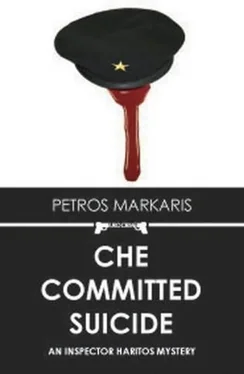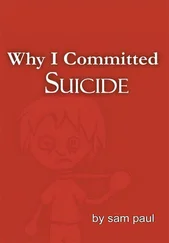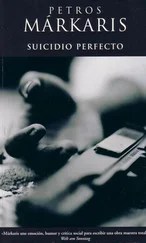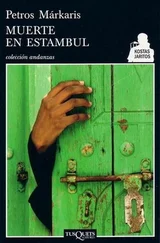After so long, it was the first time that we had some clues and connections. At least, I was now certain that Favieros, Stefanakos and Vakirtzis not only knew each other, but also had dealings, and seemingly shady ones at that.
‘Print out two copies,’ I said to Koula. I intended to rush with it to Ghikas. Why shouldn’t he have a bone to lick, like me, to slake his hunger a little.
‘Well done, both of you. You’ve done a good job.’
A smile spread over Koula’s face, but Spyros didn’t appear to be too impressed by the honourable mention.
‘Can we take a look at Vakirtzis’s computer soon?’ he said, still with his eyes fixed on the screen. Apparently, it was the only view that interested him.
‘You’ll get your chance, but why is it so urgent?’
Once again he gave me the look that was somewhere between surprise and contempt. ‘Because you told Koula that he had a computer, but that he didn’t use it much. There’s a fifty-fifty chance that it had a cleaning program. Maybe sixty-forty. But even if it did, his suicide was just the other day and we might still find some data on the hard disk.’
‘All right. I’ll arrange it for tomorrow. In the meantime, go on searching through the records at the Ministry of Trade in case we turn up something on Vakirtzis.’
While they were printing out the notes from the computer, I phoned Ghikas to tell him to expect me.
It appeared that the police officer with the magazines had either been sent packing or had gone to find Ghikas’s wife at the hairdresser’s. Sitting in his place was a young man, who, if nothing else at least, had his computer switched on and asked me my name and what I wanted.
Ghikas was so anxious that he didn’t even bother to greet me. ‘Give me something that I can pass on, because the Minister is phoning me every few hours.’
Without a word, I spread out the notes from Stefanakos’s computer on the desk before him, as though I were laying out the cards for patience. He read them carefully, one by one, then lifted his eyes and looked at me. ‘Conclusions?’ he asked.
‘First of all, the most obvious. Vakirtzis wasn’t just a journalist, he was a businessman too. We’re trying to find out what businesses he had his hand in. It’s just a question of time. The second conclusion is that Vakirtzis was blackmailing Stefanakos, either because he wanted a share in his wife’s business or because he wanted to work with her. It seems, too, that Favieros was caught up in all this business.’ I paused for a moment and looked at him. ‘I don’t know how pleased the Minister will be about all this stuff on Vakirtzis.’
He shrugged. ‘I don’t think he’ll lose any sleep over it. He’d become a pain in their necks of late. He never let up with his attacks and he’d really got on their nerves. If I’m to judge from what you’ve told me, his attacks were aimed elsewhere.’
‘I still don’t know who “M” and “K” are.’
He shook his head and sighed. ‘I can’t imagine who “M” is either. But if “K” is who I think it is, then the Minister will have trouble swallowing it.’
‘Who do you think it is?’ I asked curiously.
‘Karanikas, the one who’s overseeing the Olympic building projects at the Ministry of Public Works.’
Ghikas was thinking of the Minister, but I was imagining Petroulakis’s face when he learned where we’d got to.
‘Can you arrange for me to talk to Karanikas?’
He stared at me with an expression of both anger and amazement. ‘Are you out of your mind? What evidence do you have to talk to Karanikas? Are you going to open up your hand to him? The next day, it’ll be all over the newspapers, the radio and the TV channels.’ He paused for a moment, then added slowly: ‘Old habits die hard, it seems. You’re back to your old ways.’
I didn’t persist, because at bottom he was right. I really didn’t have enough evidence to get Karanikas to talk and, if the investigations leaked out, it wouldn’t only be Ghikas who hung me up by my fingernails, but also Sotiropoulos, who was banking on an exclusive scoop.
‘I want one more favour from you.’
‘Like the one with Karanikas?’
‘No. I want you to get me the cassette of Vakirtzis’s programme from May 21st, the one where Stefanakos says he was being blackmailed.’
‘If there is one, I’ll get it for you.’
‘Tomorrow, I’ll send Koula to take a look at Vakirtzis’s computer. If I have any problems, I’ll call you.’
‘Do that and I’ll sort it out.’
The good climate was back again, but as I got up to go, he fired a warning shot at me: ‘Take care, Costas. We’re walking on a tightrope and if we put one foot wrong, there’ll be no one to save us. Did you see what happened with Petroulakis?’
I preferred not to answer so as not to commit myself, though I knew he was right when he said that we were walking a tightrope.
The way things were going, the Green Park looked like becoming a regular haunt for my clandestine meetings with Sotiropoulos. If it had been winter, we would have gone to sit aside in some quiet booth. But it was summer and the previous day’s lousy weather was continuing with the humidity stultifying. So we chose a table at the back, among the trees, to avoid any indiscreet eyes.
I’d asked to see him because the search done by Koula and her cousin, Spyros, had not revealed even one company owned or joint-owned by Vakirtzis. Spyros had even managed to get into the tax returns, but had found nothing. I began to have doubts about Logaras’s reliability, but then I reflected that he no doubt knew what he was saying; we were the ones who didn’t know where to look. And so I had decided once again to have recourse to Sotiropoulos, who was after all a colleague of his and, as was usually the case, would know far more than the Ministry of Trade.
This time, however, I was facing an uneasy Sotiropoulos. He took a sip of his iced coffee and stared at me with the look of someone in a tight corner.
‘You’re asking me to reveal the secrets of a colleague who died in a tragic manner. It’s not exactly easy for me.’
‘Secrets or skeletons? Because Logaras, who knows everything, seems to be talking more of skeletons.’
He remained silent and took another sip of his iced coffee.
‘And there’s another thing,’ he said, even more tense. ‘Vakirtzis and I both came from the same ideological background.’
‘So what?’
All that stuff concerning ideological background meant nothing to me and I was at pains to understand where he was leading. Apparently, however, he took my reaction as an expression of disparagement because it rankled him.
‘You’re quite right. It was my mistake to bring up ideology,’ he said sarcastically. ‘You coppers don’t have a clue about the meaning of comradeship and solidarity.’
After several weeks, Sotiropoulos was back to his normal self. Except that, in the meantime, we had grown familiar and the relations between us had changed.
‘You know, Sotiropoulos, how I used to refer to you before we got to know each other better?’
‘How?’
‘Robespierre in Armani. And with those little round glasses that you and your intellectual friends wear, like the ones that Nazi butcher Himmler used to wear.’
He stared at me for a moment in astonishment and then burst out laughing. ‘You know, you’re not far wrong.’
‘But I’ll give you one thing.’
‘What?’ he asked, genuinely curious.
‘You’re above board. You might use pressure to come up with a story or exaggerate your reports or make us out to be incompetent, but you never do it for your own ends. You don’t try to scare or blackmail to make money for your businesses.’
Читать дальше












